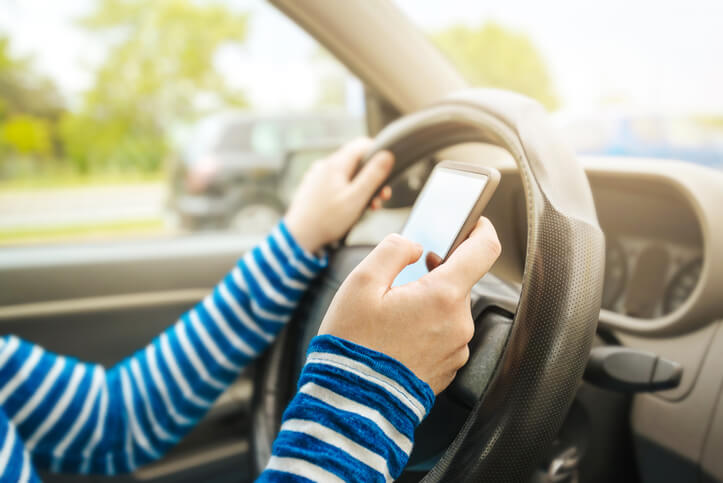What To Know About Florida’s New Ban On Texting While Driving

Florida lawmakers want drivers to stop texting while driving. Signed by Gov. Ron DeSantis, Senate Bill 76 aims to reduce the occurence of car accident-related injuries and death due to distracted driving by increasing from a secondary to a primary violation texting while driving. To help prepare Florida drivers for impending changes to texting and driving traffic laws, the personal injury lawyers in Orlando with 911 Biker Law offer tips on what to keep in mind before getting behind the wheel with a cell phone. If you are pulled over for texting while driving in Florida or if you are injured due to a distracted driver who was texting while driving, contact us for comprehensive counsel to defend your rights.
Officers Can Pull Over Drivers For Texting
According to Florida Statute § 316.305, texting while driving is already illegal. Under the current law, drivers who text while driving may be cited only if the law enforcement officer stops the motorist for violating another type of traffic offense. The new legislation, to be in effect on July 1, 2019, allows officers to pull over drivers who text and drive without the need for an additional violation. There is a grace period — October 1, 2019, to December 31, 2019 — during which drivers who text may be pulled over and issued a verbal or written warning. On January 1, 2020, individuals who are caught texting and driving may be issued citations and other penalties. Contact a texting while driving lawyer with our firm for more information.
There Are Penalties For Texting & Driving
Penalties for a first offense include a $30 fine as well as any applicable court fees and other costs. A second offense carries a $60 fine as well as three points on the driver’s license and any applicable court costs or fees. First-time offenders may be able to avoid penalties by appearing before a judge and providing proof that they have purchased a hands-free Bluetooth device and agreeing to enroll in a driver safety course. If you have been pulled over for texting while driving in Florida, contact experienced traffic ticket lawyers in Orlando with 911 Biker Law.
School Zones & Work Zones
According to the new Florida texting and driving law, drivers are not allowed to handle their phones for any purposes other than an emergency while driving in school zones and work zones. First-time offenders who are caught texting while driving in school and work zones may receive points on their license in addition to a $30 fine and other applicable fees.
Drivers Can Text While Vehicles Are Stationary
The new law allows drivers to text while behind the wheel of a stationary vehicle, or a vehicle that has come to a full stop, such as at a red light. The law states that "a motor vehicle that is stationary is not being operated as is not subject to the prohibition." If you are pulled over while texting at a red light or texting while on the side of the road, contact a distracted driving lawyer with our law firm today to help defend your rights.
Drivers Can Use Their Phones For Navigational Purposes
Under Florida law, drivers and rideshare drivers alike might still be able to use their phones for navigational purposes while operating a motor vehicle. However, the legislation specifically requires that navigation apps — such as Google Maps and Apple Maps — be used in a hands-free manner, such as with a hands-free headset or a dashboard phone mount. Drivers who operate under rideshare companies, such as Uber and Lyft, are encouraged to enable voice navigation and make use of other hands-free features to properly adhere to the new law.
Talking While Driving Is Still Permitted
Drivers who text and drive may be penalized for violating Florida's traffic laws, but drivers who talk on the phone or use voice commands while on state roadways act within the bounds of state law. In fact, enabling voice commands is recommended as an alternative to manual phone usage while driving. Contact a texting and driving lawyer with 911 Biker Law today to learn more about the new law and how the new requirements may affect you.
Law Enforcement Will Collect Driver Information
The texting and driving bill passed with two important provisions — one of which requires law enforcement officials to record both the race and ethnicity of each driver they ticket for texting and driving and, thereafter, submit the collected information to the state. The purpose of the collection of information serves to help state lawmakers determine whether the new law is being applied evenly — or unevenly — across all races and ethnicities.
Drivers Are Not Required To Hand Over Their Phones
The second provision to the Florida cell phone law regards the ability of law enforcement to prove whether a driver was texting, rather than using a navigation app while driving. To prevent police from stopping a driver as a means to search the driver’s phone, lawmakers require that law enforcement officials inform drivers that they have the right to decline a search of their phone. Without a warrant or without the consideration of the phone as evidence following a car accident, police cannot demand a phone from a driver. If you are stopped for texting and driving and a law enforcement agent demands your phone without providing a warrant, contact a vehicular crimes defense attorney with 911 Biker Law to ensure the protection of your rights.


